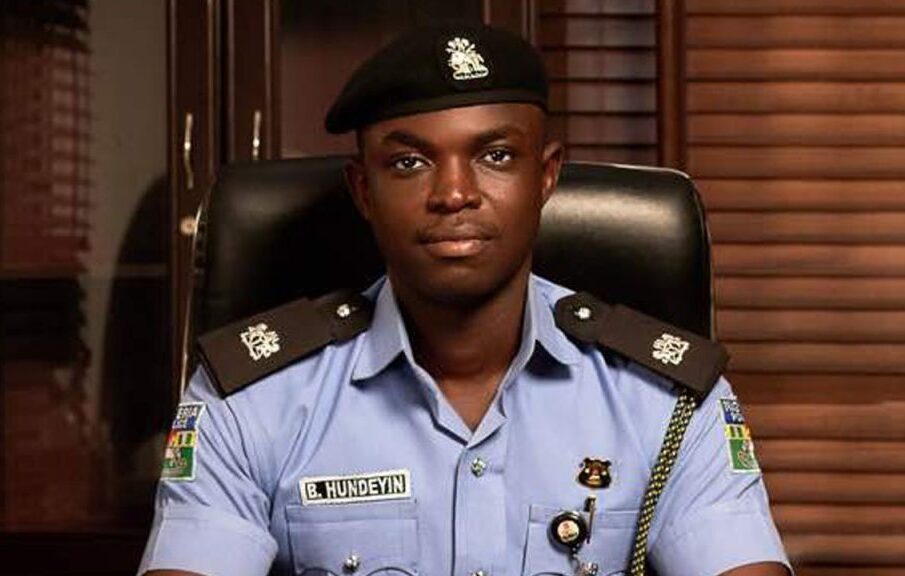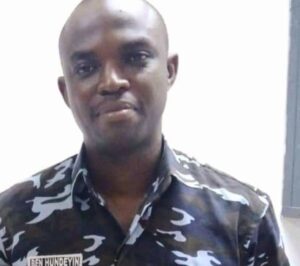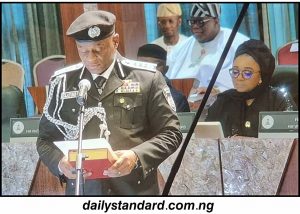One person called me Cretin… I was like wow, only me – Hundeyin Lagos police spokesman

Benjamin Hundeyin, a Superintendent of Police, is the Lagos State Police Public Relations Officer. He speaks with JULIANA FRANCIS on various issues. (Culled from The 
 Eagle Online)
Eagle Online)
Tell us a bit about yourself
I am from the Badagry Local Government Area of Lagos State. I attended Lagos State University for my first degree in English Language and my master’s programme was at the University of Ibadan, where I studied Legal Criminology and Security Psychology. I joined the Police Force as a Cadet Assistant Special Head of Police, and I am married with children.
Why did you choose police as a job and career?
I am, if there is anything like that, a perfectionist. Sometimes I suspected that I have Obsessive Compulsive Disorder, a disorder that makes one want to see everything done perfectly. I don’t want a single thing to be out of line. Everything must be perfect.
Growing up, it always irritated me to see people leave the traffic route and drive against traffic. It irritated me to see people jump a queue. I always wanted things to be in order and I couldn’t just force people to do things because I didn’t have any legal backing. So, I thought about it, and it dawned on me, that wow, the police could give one the power to make people fall in line and be in order without necessarily going against the law. So, I’ve always wanted to be a Police Officer. It was a bit discouraging when I saw that many policemen were not appreciated. It was discouraging. People would always look down on the police. So that urge to be a police officer wasn’t that strong until I stumbled on the personality profile of the late Inspector General of Police, Tafa Balogun. I read it and saw how educated he was, and I was impressed. I said to myself oh, so educated people were in the Force. I could be educated too and be a police officer, and so the interest was rekindled. I worked towards it, and I think God was just on my side. I tried once and I got it without having any Police Officer in my family, without the necessary connections people would say. I just got it, and that was how I became a police officer.
What is your greatest challenge as a Command’s spokesman?
The greatest challenge I would say is having to speak when our men have clearly misbehaved. It is a big challenge; after you’ve said the police are your friends, police will do this, police will do that, and then our men misbehave, and you must face the same people to tell them what happened and how happened and why. We must apologise, and we have to look into it. So, it’s a big challenge and it’s a big one. Beyond that, I would say another challenge I have, which is localised, it’s about being a spokesman in Lagos State. In Lagos State Police Command, phone call traffic is high. You pick people’s calls, and word goes around that: ‘Oh that guy picks his calls, he’s so nice on the phone, oh he’s polite, he’d look into your matter.” After that, the number of call phones we receive increases geometrically. It’s now becomes overwhelming. Call after call, messages and messages, and I still must attend to emails in the office and you still need to attend functions. It tends to become challenging. But so far, I’ve been able to keep afloat. I’ve been able to maintain an equilibrium.
What will you say is your greatest achievement as a spokesman?
My greatest achievement as a spokesman is yet to come, but so far, I’ve been able to break some barriers in terms of access to police officers. I’ve been able to break that illusion that ‘oh there’s a wide gap between the people and the police,’ like they’re unreachable or inaccessible. I’ve been able to break that by publishing the phone numbers of all Divisional Police Officers. It’s on my WhatsApp profile, it’s on my Twitter page, and for every opportunity I have, I share it. However, when things work for people, they don’t really talk about it. It is only when it doesn’t work, they complain about it. There are many people who have privately told me: ‘Oh thanks for that list, I called this or that DPO and he sorted out my issue.’ So I’ve been able to make people know that they have an access to our policemen. People tell me that I am the most accessible Police Public Relations Officer they’ve ever known because I try to attend to messages, listen to people, enlighten them, disabuse their minds about certain things, and make them know certain things, which they do not know about the police. I believe that is my greatest achievement so far: Bringing people closer to the police. Maybe we’re not as close as we want, but still, the people are closer to us than they were before.
How do you handle fake news and fake journalists?
I know of fake news, but I don’t know which one is a fake journalist. A journalist could be a real journalist and still carry fake news because I’ve experienced one or two while in office. For me, I handle fake news by usually debunking it! Luckily for me, I’ve been able to create a formidable platform on Twitter. So my Twitter account is of interest to many people, who want to see what Ben has to say next. Some people will say: ‘Oh let’s hear the nonsense he wants to say again.’ But the good thing is that I use that platform to debunk fake news immediately after I come across it. In one extreme case, I had to send for a journalist. I had to write to the headquarters of that media house and tell them to release the journalist to come and answer questions bothering on spreading false information, but basically debunking it. We call out those that give fake news, we let people know the news was fake and this is the person responsible for the fake news. The way we name and shame our officers that misbehaves, I also let people know who is behind fake news so that they don’t run along with fake news.
How do you handle being called names and insulted on Twitter?
Initially, it was disturbing. And at a point, I thought of logging out of Twitter. I thought of just leaving, but when people noticed a day or two of silence on my part, some people reached out to me saying: ‘We’ve not heard from you.’ And I responded that those of them on Twitter were rude. They’ll tell me to ignore those rude ones and continue with what I was doing. They told me that there were many of them who enjoy the information I give out. They further said that they usually did not come out to support my opinion so that they wouldn’t be dragged. They said that most times when they wake up, they first check my Twitter page to see what I had shared. I have learned to ignore insults and curses too. It’s sometimes it’s worse than you see. Sometimes people come to my inbox, send a private messages, saying all sorts of rubbish. They abuse me, with some saying I would lose all my family members. They’ll rape all my daughters. That I would die. I’ve learned to ignore them. When I see such tweets, I’ve been able to resist the urge to reply and I just delete the messages sometimes. But occasionally when I feel like catching fun I will respond. A few people have seen through me to know that this guy is catching a cruise. When I feel like catching fun, I just talk back at one or two people and then sit back and watch people’s responses. Some people will go: ‘Oh you’re a spokesperson, you shouldn’t be talking that way.’ And my supporters will come and say: ‘Why shouldn’t he talk that way, they’ve been abusing him since yesterday, you didn’t call the abuser to order, he now replied just once and you’re saying he shouldn’t talk that way.’ So, by and large, I’m used to it. I’ve come to accept it as a price I have to pay for being the spokesperson for the Police in Lagos State Command.
What is the most painful or horrible name or insult you’ve been called?
People have called me all sorts of names, everything you can imagine. Some say this guy is dumb, this guy is so stupid, how did this guy get this position, he must have lobbied, the system of Nigeria where you must know somebody like he is not deserving, he makes a terrible job of it, he’s a fool, he’s a mumu, he’s a this and that. But there’s one interesting name somebody called me, not because it’s horrible, not because it’s painful, but because it was new to me. I was like: Wow, which one is this again? The person said I was a ‘Cretin’ and I checked the dictionary and I was like wow, only me, all these abuses? I found it interesting, in fact, I called my wife and said see oh, I have learned a new abuse today. They said I was a Cretin and we laughed over it. I think that one is memorable.
If you are not a policeman or spokesman and someone insults you, how will you react?
Oh, most definitely if I wasn’t a public servant, not just a police, and somebody abused or insulted me, I’ll abuse the person back, immediately, in double fold. But the ethics of my profession, the ethics of the position I’m holding, do not allow me to engage in such behaviour and so I must play according to rules.
Comparatively which is tougher, being a conventional policeman or a spokesman?
Well, I would say they’re both tough. Being a policeman at all, is a tough job. If you do the right thing, people will say: ‘He’s doing his job so why should I say well done or thank you.’ You do the wrong thing and they come after you and say: ‘You can imagine, our police officer, see the way they’re behaving.’ Just wearing the uniform and being out there makes you a target to criminals. If there’s a robbery, you’re the first target, you’re the first to be brought down. If you’re doing an investigation, powerful people will call you and say: ‘Oh, let the suspect go. We will give you money or we will kill you or we will kidnap your children.’ The good people will say: ‘Don’t let somebody use you.’ Most times, I will be in a dilemma. I have to stay strong to take the right decision and then as a spokesman, it’s quite difficult, having to talk about negative things that have occurred. There are moments of pride too when our men have done well, times when they cracked a case, times when arresting suspects, those times make me proud and I speak proudly. But for me, because I’m popular on social media, it has altered my lifestyle. Ordinarily, I would trek down the street to get something, but the last time I did that, to just trek down the street, people that were driving motorcycles recognised me. ‘Oh PRO.’ I said to myself, no, I don’t want to be recognised everywhere I go. These days, if I go into a supermarket to buy something, nobody recognises me because I’m in mufti. I always look different in mufti, but immediately I pull out my card to pay, and the cashier checks my name, Benjamin Hundeyin, he, or she goes: ‘Wow! You’re that Police Officer, I know you.’ And I’m like: ‘Oh there we go again.’ If that can be regarded as tough, then yes, that is a bit tough on me. In fact, to be frank with you, I love walking and I love being free, but since I became PRO, I have had to choose and watch my movements carefully. There are certain places I do not go and there are people I don’t mix with.
What do you think journalists can do to make your job easier?
I would love for journalists to embrace technology, embrace social media. They should not hate social media and they shouldn’t kick against it. It has come to stay. That is a new reality. When journalists get angry, saying: ‘Oh you are a Twitter PRO, every little thing, you run to Twitter, you don’t give us news.’ These sets of journalists will still want me to do press statements, sign them, and then send them to their emails No! The world has moved beyond that. I would like journalists to take advantage of social media. And thankfully, a few have done that, a few follow me on Twitter, and switch on notifications for my tweet. This means that the moment I tweet, they are alerted. Twitter does not allow you to tweet more than 160 characters per tweet, so I just give limited information on arrest and leave it like that. Those that are taking advantage of social media will now reach out to me, asking for further details. Details like where the incident happened, how it happened, and the people arrested. I would give them and by the time they do their story, they have a fuller version of that tweet story. So, those few journalists do not take offence that I use social media or tweet information on Twitter. If journalists want to make my job easier, I would like them to make use of social media: Twitter, Instagram and WhatsApp. Since I became the Police PRO, I have not sent any press statements via email. I created a WhatsApp group, where I added most of the journalists and I also used to share press statements there. The moment they see that the statement is from my number, they know it’s authentic. So, more journalists should embrace social media and make use of it.
What can Nigerians do to make your work as a spokesman easier?
I don’t think I can demand more from them. They are doing a lot already. They are doing what they need to do. They engage me, they point out issues to me, and they let me know what is happening in different parts of Lagos State. They commend me too when they feel I need commendation. I always tell them if they see something, they should say something, which they do regularly. So as a spokesman, they are doing a lot. Maybe what they can do more is to make the jobs of police officers out there easier. Maybe they can be more patient and more civil in their engagements with police officers. But for me, I’m not complaining. In fact, I’m super impressed with the love they show.
What do you think Nigerians need to do to make policing less challenging?
Nigerians just have to be more patient with police officers and they must be civil in their engagements with police officers. Nigerians are very condescending when speaking or addressing police officers. It’s annoying sometimes. There was a time someone called me to say that our policemen stopped her and were harassing her. I asked her to explain exactly how the policemen harassed her. What did they do to her or what did they say to her? She replied: ‘No, they just stopped me. That is harassment.’ I told her that I didn’t understand and asked her to go give any police officer there the phone. I asked the policeman what the problem was. He explained that he had just flagged the car and even before he could say anything, the woman was already making calls. He said they were patiently waiting for her to finish making her calls, to ask her necessary questions, but the next she did was just shove the phone into his hand, saying he should speak with the Police PRO. You can imagine such. A policeman stopped you, he hasn’t said a word, and you called me claiming that he was harassing you. How is that harassment? This is something that happens all over the world. Police have the right to stop you and ask a few questions. Sometimes it’s for your good. Sometimes a policeman will want to see if the baby at the back of the car is a stolen one or not. Once we recover a stolen baby, the mother of the baby will be very happy. She will be grateful that police stopped that vehicle that day. We want to see if the vehicle is a stolen vehicle. Owners of recovered vehicles are ever grateful to the police. So you just need to be patient when police officers stop you. When there is no harassment, don’t just describe the situation of police stopping you as harassment. I think Nigerians should be more patient and more civil in their interaction with the Police, but that doesn’t mean they should accept any unlawful behaviour. If something unlawful happens, Nigerians should reach out to the appropriate authorities and do that with safe means. They should not put themselves in harm’s way. If a police officer is acting so stupid and dangerous, just stay calm, and don’t aggravate situations. Then the moment you get out of it, just let us know how it all went so that we would be able to take appropriate actions.
As a policeman what do you see about human nature that shocks you?
It’s the stark reality of an age-long scene that you don’t listen to one side before passing judgment and always listen to both sides. You’ll be shocked at what you’ll discover after you listen to the other side of the story. This has been so shocking to me, extremely shocking. I’ve seen a bleeding person, who runs to the station to report that he was attacked, and the nature of his injury would have made some police officers be angry, asking why anyone would inflict such a wound on a fellow human being. But just wait to hear from the other person, and you will be shocked to discover that it was self-defence; the person that ran first to the station was the first to launch an attack. This person is the attacker, he has already cut off the person’s entire arm and he was about to stab him to death, and this person defended himself. I’ve also seen a girl cry rape, and when we investigated thoroughly, the girl recanted. She said the alleged perpetrator never touched her, and that she wanted to teach him a lesson for not minding his business. Many more such incidents. So I’ve come to realise that you shouldn’t listen to one side before you pass judgement. Also, unfortunately, my job is messing with my brain, or with my mind, and I do not trust anybody. I just don’t want to trust anybody because I’ve seen great men, popular men, reputable men, men of honour and character, names you know, I’ve seen them do terrible things, and when it got to the police, they are able to settle with the victim, settle out of court and all of that because they don’t want it to come out. But till today, I am so shocked about the things some people do. That is one thing I have learned on this job.











